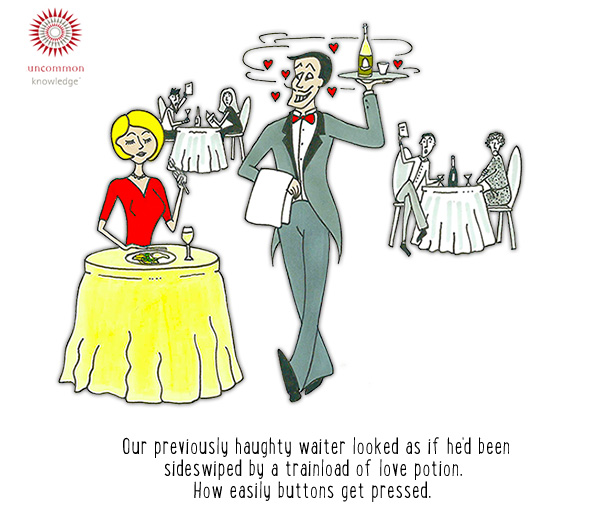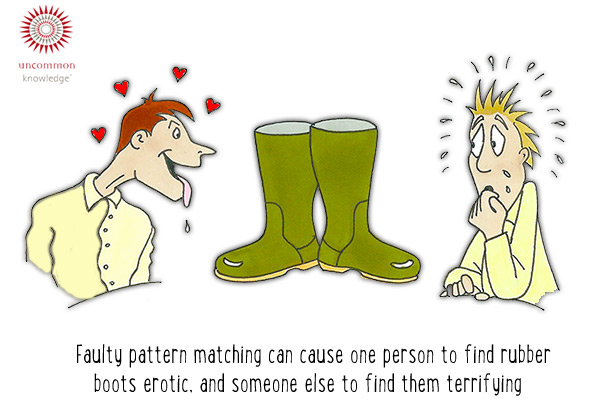How to Know Yourself
Why 'pattern matching' is the secret to understanding why you behave the way you do
"Without self-knowledge, without understanding the working and functions of his machine, man cannot be free, he cannot govern himself, and he will always remain a slave."
~ G. I. Gurdjieff, Russian Spiritual teacher
A rare event, I was having dinner at a very upmarket restaurant with a couple of friends.
Our waiter: middle-aged, seen it all before, long-suffering but lets you know it. Providing the slightly sneering service that you just know is going to result in the disappearance of a generous slice of your bank balance.
The ritualized expensive charade was in full swing when in glided one of those obscenely beautiful women that have no right actually existing, but do anyway. All silky smooth skin, lilting walk, political incorrectness, full lips, and perfect features with a glint of mischief in her crystal clear eyes.
You could almost hear the disdainful sigh of collective female ruffled feathers as she sauntered across the room with the self-assurance that comes pre-packaged with beauty and a complete absence of self-doubting personal appeal issues, which is quite rare. I think she was with somebody else, but cannot be sure.
But I did notice our previously haughty waiter looked as if he'd been sideswiped by a trainload of love potion. I swear he was simpering as he approached her.

The rest of the evening was a blur of distracted waiter, distracting beauty, fine wines, and shocking expense. How easily buttons get pressed.
Pesky button pushers
The waiter, like the rest of us, had an automatic mechanical response to this woman. The lust/envy button gets pushed pretty damn quickly and has little to do with how we believe we 'should' respond. These responses are not thinking ones but feeling ones.
But this was just an obvious illustration of what happens all the time. Much of life is lived mechanically:
- Click, whirr...you hear a tune on the radio and it makes you feel like you did when you first heard it.
- Click, whirr...your partner gives you that look and you feel homicidal.
- Click, whirr...you hear the word 'chocolate' and you salivate.
- Click, whirr...you have been programmed with a fear of flying and so feel fearful when you fly.
Old 'programming' patterns get played through and through. Does it have to be that way? Yes, but only to the extent that it is useful.
I, Robot
Much of life needs to be negotiated automatically.
If you're a car driver, I'm hoping you have been 'programmed' to stop automatically when you see a red traffic light. Someone speaks your native language to you and you automatically or 'mechanically' respond to their words by instantly understanding their meaning.
To make living easier, much of life has to be mechanical and automatic.
But if all we are is a matrix of on/off buttons, then where exactly in all of that is your free will? Where is your independence to rise above your own conditioning? To be more than a fleshy robot reacting predictably to environmental stimuli produced, as they were, from the accident of what culture you happened to be born into?
Know thyself and get a grip
Psychologists call this automatic response to environmental stimuli 'pattern matching'. A trigger or 'pattern', such as a loud noise or the whiff of perfume, produces a matched response within you.
Some pattern matches seem to be 'hard wired' – that is, we are born fully equipped with them. Young babies know how to suckle milk from a nipple without having to be taught. This pattern is instinctive and pre-packaged.
But many pattern matches are learned. Every word you are currently reading is pattern matched in your mind to a response or association you have with the word so you can create meaning from what you read.
If someone passes you your jacket as you're going out, the pattern of your jacket is matched to the response of you putting it on. But if you hand a tiny newborn baby its jacket, it won't know to put it on because that pattern match hasn't been learned yet.
So much pattern matching is useful, even essential. But when pattern matching goes wrong and keeps going wrong, we develop problems.
The wrong response to the wrong stimulus
Pattern matching is, by necessity, a sloppy process. To be adaptable, we need to have the capacity to respond in lots of different ways.
You need to be able to put on more than just your own jacket if you have forgotten yours and someone lends you theirs in a freezing snowstorm. We need this flexibility. If we learn that hungry lions are dangerous, then we need to learn to fear all hungry lions, not just the particular one that attacked us.
Your brain errs on the side of caution by over-generalizing the learning it receives. This is great – except when it works against you.
For example, if a baby suckles milk from a breast, this is a perfect pattern match. If it suckles milk from a plastic bottle, this is a sloppy pattern match – but it still works to feed the baby, so that's fine. But if you stick your finger into the baby's mouth and it tries to suckle milk from your finger, this is a faulty pattern match because it's not working.
All psychological problems involve faulty pattern matches
We can see faulty pattern matching going off all the time within people who have problems. Someone felt unloved or despised by their parents and feels disliked (even when they are not) by adults in their lives decades later. They've taken one pattern and faultily applied it where it doesn't belong.
Depression can, from one point of view, be considered a collection of faulty pattern matches, which is why something that others might see as 'good' can happen to a depressed person and they might still put a negative spin on it. Because of their pessimistic reasoning style, negative assumptions about the world, and tendency to summon up unhappy memories rather than happier ones, depressed people respond differently to life than how they would normally.
A stage hypnotist will 'teach' a talented hypnotic subject a faulty pattern match for the amusement of the audience. Such as when they are presented with a broom and automatically feel the need to serenade it. In a short-lived context, this isn't seen as a 'psychological problem', but it certainly would be if it persisted.
Phobias and fetishes
Phobias, sexual fetishes, and many addictions are pattern matches gone wrong or 'faulty' pattern matches. Something that isn't really threatening is faultily matched to the panic response. Or something that doesn't really have to do with sex is linked to the sexual arousal response.
Some people are phobic of rubber boots, some people are aroused by them. Same stimulus, different (and 'faulty') responses.

It's as if an evil stage hypnotist had produced these faulty pattern matches, although of course this hypnotic learning just came about through being human and having certain life experiences.
Even some physical problems are faulty pattern matches
So, all psychological problems can be seen as faulty pattern matches. There is no natural association between having a cup of coffee and lighting up a cigarette; this faulty pattern match had to be learned.
But some physical problems are also faulty pattern matches. An allergy occurs when the body's histamine response fires off when it isn't genuinely needed due to a certain trigger, such as nuts, cat fur, or pollen.
Because of this, phobias, PTSD, and depression have been (rather clumsily) described as 'emotional allergies'.
But we can see the connection between faulty matches both in the body and the emotional mind.
Pattern matching occurs outside of thought
We use therapeutic hypnosis to help change unhelpful pattern matches. Hypnosis can also be amazingly effective for allergies (1) and people who are very allergic and believe they have been exposed to their allergen trigger when they haven't can still produce an allergic response! (2)
The reason behind the effectiveness of hypnosis for changing unhelpful pattern matches and easing allergies is the same reason why pattern matching happens automatically. Pattern matching occurs outside of what is normally considered 'thought'.
This is because when you need to master a learning, it needs to become automatic. When I learn a new piece on the guitar, after a while it becomes easier to play it without thinking.
It's not always necessary for people to know why their faulty pattern matches arose to help them.
An unfamiliar idea for improved self-knowledge
In our modern age, we have come to fear 'being offended', as if causing offense were the worst thing possible. But whenever you feel offended, there is an opportunity to observe why, to see button pushing in operation and gain some self-knowledge.
This is why spiritual teachers of the past would sometimes purposefully cause offense, bafflement, or anger in their students to better lay bare the 'workings of the machine'. This is an unusual idea to many westerners interested in spiritual ideas and may seem unpalatable because of its unfamiliarity.
The more we can all observe ourselves, get to 'know the machine', and know our buttons, the more self-knowledge we gain.
Whether you automatically fear or hate authority, feel irritated by someone or thing, feel afraid, or feel compelled by something, it's important to understand that this is natural hypnosis caused by your innate learning mechanisms at work, that these automatic responses can be altered (but that many are useful), and that real independence in life involves being able to see yourself for who you really are and to choose, at least some of the time, which buttons to push rather than waiting to have them pushed for you.
Learn more about how the unconscious mind works by watching Learn Hypnosis, my free video series.
References
- Zachariae, R., Bjerring, P., and Arendt-Nielsen, L. Modulation of Type I immediate and Type IV delayed immunoreactivity using direct suggestion and guided imagery during hypnosis. http://onlinelibrary.wiley.com/doi/10.1111/j.1398-9995.1989.tb04198.x/abstract
- Kirsch, I. (ed.). (1999). How Expectations Shape Experience. American Psychological Association. Pg. 336.






